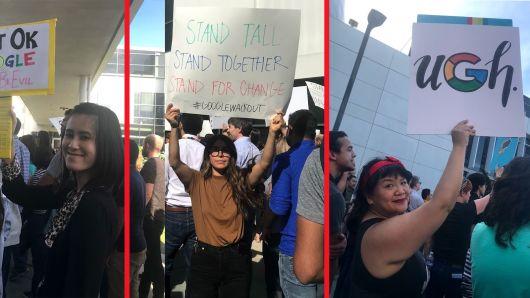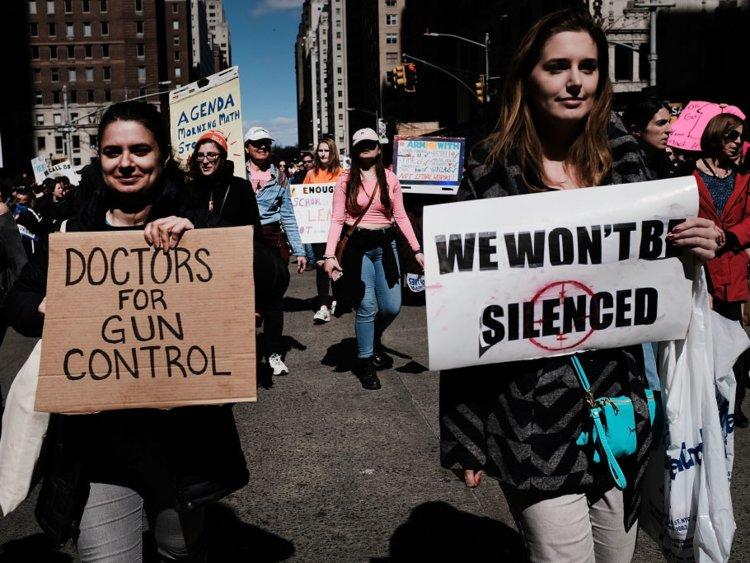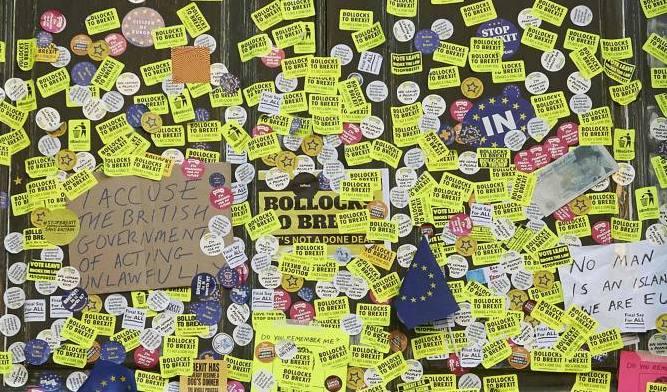Brands Taking Stands | What’s Next: Employees Take Stands
Brands Taking Stands™ Newsletter | November 7, 2018
THE BIG STORY
What’s Next: Employees Take Stands
When I began this newsletter exactly one year ago, the inspiration came from the increasing CEO activism I saw taking place throughout the business community. I had been reporting for 3BL Media on this movement since its beginnings, in 2014, when Apple’s Tim Cook and Starbucks’ Howard Schultz spoke out on gay rights and race, respectively. From their positions at the top of highly profitable companies with large, loyal consumer bases, I thought their statements bold and welcome, although privileged and perhaps unique.
In 2015, the “bathroom” and “religious freedom” bills proposed in several states prompted statements in opposition from dozens of prominent CEOs from all sorts and sizes of companies—the rules of the game had clearly changed. Following the inauguration of the current administration in 2016, issues of immigration, gun control, climate change, and gender equity rose to the top of the agenda at many more companies; C-suite executives and boards began regularly commenting publicly on social and political issues. Since then, many hundreds of CEOs have signed on to one or more collective statements on these issues (notably, 550 chief executives are supporting CEO Action for Diversity and Inclusion).
Now, on the cusp of 2019, a second wave of disruption in business-as-usual has hit with full force: Employees taking stands. Last week, 20,000 Google employees walked off their jobs in 50 offices around the world to protest revelations that the company had fired three senior executives over sexual misconduct, paying one of them a severance package of $90 million. The reveal came from an article in The New York Times, not from any internal Google announcement. The lack of transparency, on top of the original payoff, angered the company’s employees and ignited calls for collective employee action: A one-day “strike.” (The company subsequently informed its team that 48 employees had been fired over the past two years without severance packages for sexual misconduct reasons.)
Google employees were protesting their workplace culture, which they felt had protected sexual harassers if they were senior-level executives. From a company with the motto “Do No Evil” and a parent company, Alphabet, with the slogan “Do the Right Thing,” they expected much more. Their demands to the company were basic: Improve transparency in reporting on sexual conduct, end pay and opportunity inequity, and elevate the position and authority of the chief diversity officer.
“Employees are now a company’s most powerful interest group” says Alison Taylor, a managing director at Business for Social Responsibility (BSR), in an article for the Harvard Business Review: “When CEOs Should Speak Up on Polarizing Issues.” She explains that “workers are freely using the tools of this hyper-transparent era — including petitions and email leaks — to land punishing blows against corporate reputations and finances, in the process emerging as companies’ most powerful interest group. At a time when the U.S. economy seems to be approaching full employment, employees have more influence over whether and how their leaders speak out.”
There’s no doubt that Google employees are protesting from a privileged position. The company is “built on human capital and nothing else,” John Wilson, Cornerstone Capital Group’s head of research and corporate governance, is quoted as saying in the HBR article. “Google hires people who can work anywhere. So if employees don’t trust the company will have their backs, it will impact Google’s ability to attract, retain and motivate employees.”
Read more >>>
NEWS YOU CAN USE
FedEx Scales Back Its Gun Business
The hot-button issue of gun control has flared up again, following the mass shooting at a synagogue in Pittsburgh, and FedEx has canceled its marketing partnership with the National Rifle Association (NRA). The move was a reversal of the company’s position earlier this year. Following the Parkland, Florida school shooting, the company had refused to end its discount program for NRA members, despite pressure from gun control activists, saying that it “does not and will not deny service or discriminate against any legal entity regardless of their policy positions or political views.”
What changed? FedEx said that it was a business decision, part of what the company said was a months-long review that resulted in the deletion of more than 100 such partnerships, the NRA among them. According to the company, the bottom line was the driver in making the decision: NRA members did not generate enough shipping volume to make the group’s participation in the program worthwhile. It also stated that the timing of the announcement following the Pittsburgh shooting was “not prompted” by that event.
It should be noted that FedEx headquarters are located in Memphis, Tennessee, a politically “ruby red” region and state where any suggestion of gun control regulation is viewed negatively. As the 10th largest private employer in the U.S., with over 300,000 employees, the company has to deal with prevailing internal employee sentiment as well as with external social pressures on such a controversial issue. However hedged, the move marks a significant statement by a major brand. FedEx now joins Delta and United airlines, MetLife insurance, some car rental companies, and several other firms that have dropped special deals with the NRA.
70 UK Business Leaders Urge “People’s Vote” on Brexit
The Brands Taking Stands movement is not limited to action in the U.S. by American-based companies. Businesses in the U.K. now find themselves pushing back against government policies on Brexit that they think damaging to their bottom lines as well as to society in general. A public letter signed by 70 leading corporate executives has called for a “people’s vote” on any final Brexit deal. Signees include former executives from Marks and Spencer, Lloyd’s of London, and Sainsbury’s; the chief executives of Waterstones and Unipart; and the founders of Lastminute and Innocent Drinks, among others. “The business community was promised that, if the country voted to leave, there would continue to be frictionless trade with the EU and the certainty about future relations that we need to invest for the long term...the proposals being discussed by the government and the European Commission fall far short of this, and they are not nearly as good as the current deal we have inside the EU.... We are now facing either a blindfold or a destructive hard Brexit. Both these options will further depress investment. They will be bad for business and bad for working people. The uncertainty over the past two years has already led to a slump in investment, which will make our country poorer.” The letter was coordinated by Business for People’s Vote, a campaign that turned out an estimated 700,000 people for a march in London last month to demand a new referendum on the U.K.’s membership in the E.U.
The references to “bad for working people” and to making “our country poorer” show how a holistic concept of what is good for business now transcends a focus on the bottom line only. Like their U.S. counterparts, British businesses are well aware that a government policy which impacts employment could result in a recessionary consumer environment—which means bad news for their bottom lines.
Land O’Lakes, Purina Take Stands Against Racist Lawmaker While Nike Founder Draws Criticism for Record Donations
When Land O’Lakes announced it would no longer support long-time U.S. Representative Steve King with political donations due to his racist views, the shift made news far beyond the upper Midwest where the agricultural co-operative works. With $14 billion in revenue, almost 2,000 producer-members, 751 member-cooperatives, and 10,000 employees who process and distribute the products of 300,000 producers, when the company speaks, the entire U.S. agricultural community listens.
"The Land O'Lakes, Inc. PAC has traditionally contributed to lawmakers of both parties that represent the communities where our members and employees live and work and are also on committees that oversee policies that directly impact our farmer owners. We take our civic responsibility seriously, want our contributions to be a positive force for good and also seek to ensure that recipients of our contributions uphold our company's values. On that basis, we have determined that our PAC will no longer support Rep. Steve King moving forward."
Also citing “a conflict with its values,” pet food company Purina made a similar statement.
The traditional practice of companies donating to lawmakers of both parties looks to be coming in for a correction based on principles as the culture wars in politics intensify. Consumer companies in particular will have to navigate a new course between their community values for “positive good” and legislators who may hold views considered retrograde and discriminatory.
What business-as-usual will look like now that Representative King, a member of the House Agricultural Committee, has narrowly won re-election, will be unexplored territory. King, a representative for Iowa’s 4th District, has supported white nationalism, argued against immigration and diversity, and has displayed a Confederate flag on his desk.” He has also been named the “least effective member of Congress" by InsideGov due to his persistent failures to get legislation out of committee.
On the West Coast, Nike founder Phil Knight has come under scrutiny for making record political donations of $3.5 million to a Republican candidate for governor. The amount breaks the state record for an individual contribution many times over, reports The Guardian.
Nike has a large footprint in Oregon, where it is Portland’s second-largest employer. Knight is reportedly the 28th richest person in the world, worth an estimated $29 billion, according to Forbes. What’s curious is that he has made no open or consistent policy demands, other than to support fixes to the state pension system and note a lack of political leadership. How the chairman emeritus’ personal political activities will impact Nike, the company, currently riding a cultural high with its much lauded “Believe in Something” ad campaign, is an open question.
C-SUITE COMMENTS
“All of us who live in this country depend on its strong defense. The people who serve in our military work for an institution with a vital role and critical history. Of course, no institution is perfect or has an unblemished track record, and this has been true of the U.S. military.”
We want the people of this country and especially the people who serve this country to know that we at Microsoft have their back. They will have access to the best technology that we create. At the same time, we appreciate that technology is creating new ethical and policy issues that the country needs to address in a thoughtful and wise manner. That’s why it’s important that we engage as a company in the public dialogue on these issues.”
—Brad Smith, President and Chief Legal Officer, Microsoft
Excerpted from Microsoft blog.
PEOPLE ON THE MOVE
Donna Westerman has been promoted to VP, Head of ESG Global Risk at Verisk Maplecroft. Westerman has been with Verisk Maplecroft since 2016 and previously held roles at Bristol-Myers Squibb, Avon, and Mars Wrigley.
Deirdre Latour has been named Pearson's Chief Communications Officer, responsible for the company’s global corporate affairs team, which includes government relations, media & investor relations, employee communications, and brand & social impact. Prior to her new position, Latour had been with GE for 14 years and was a VP at Edelman.
Paull Young has been named Charitable Giving Lead - Social Good Partnerships, Media Partnerships at Facebook. His prior roles included stints at charity: water and Instagram.
Gil Friend has founded Critical Path Capital. For the past year, the sustainable business pioneer has been Chief Sustainability Officer for the City of Palo Alto, Calif.





